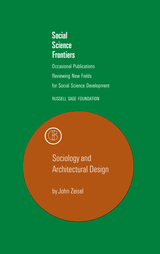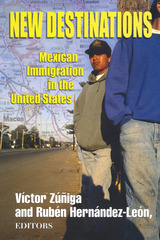599 scholarly books by Russell Sage Foundation and 5
have author last names that start with Z
599 scholarly books by Russell Sage Foundation and 5
599 scholarly books by Russell Sage Foundation
5 have author last names that start with Z have author last names that start with Z
5 have author last names that start with Z have author last names that start with Z

Sociology and Architectural Design
John Zeisel
Russell Sage Foundation, 1975
This book, encouraging more effective collaboration between professional architects and social scientists, outlines how social science research can aid the design process, detailing how physical environment relates to behavior. With a foreword by Hugh F. Cline.
[more]

Growing Up American
How Vietnamese Children Adapt to Life in the United States
Min Zhou
Russell Sage Foundation, 1998
Vietnamese Americans form a unique segment of the new U.S. immigrant population. Uprooted from their homeland and often thrust into poor urban neighborhoods, these newcomers have nevertheless managed to establish strong communities in a short space of time. Most remarkably, their children often perform at high academic levels despite difficult circumstances. Growing Up American tells the story of Vietnamese children and sheds light on how they are negotiating the difficult passage into American society. Min Zhou and Carl Bankston draw on research and insights from many sources, including the U.S. census, survey data, and their own observations and in-depth interviews. Focusing on the Versailles Village enclave in New Orleans, one of many newly established Vietnamese communities in the United States, the authors examine the complex skein of family, community, and school influences that shape these children's lives. With no ties to existing ethnic communities, Vietnamese refugees had little control over where they were settled and no economic or social networks to plug into. Growing Up American describes the process of building communities that were not simply transplants but distinctive outgrowths of the environment in which the Vietnamese found themselves. Family and social organizations re-formed in new ways, blending economic necessity with cultural tradition. These reconstructed communities create a particular form of social capital that helps disadvantaged families overcome the problems associated with poverty and ghettoization. Outside these enclaves, Vietnamese children faced a daunting school experience due to language difficulties, racial inequality, deteriorating educational services, and exposure to an often adversarial youth subculture. How have the children of Vietnamese refugees managed to overcome these challenges? Growing Up American offers important evidence that community solidarity, cultural values, and a refugee sensibility have provided them with the resources needed to get ahead in American society. Zhou and Bankston also document the price exacted by the process of adaptation, as the struggle to define a personal identity and to decide what it means to be American sometimes leads children into conflict with their tight-knit communities. Growing Up American is the first comprehensive study of the unique experiences of Vietnamese immigrant children. It sets the agenda for future research on second generation immigrants and their entry into American society.
[more]

New Destinations
Mexican Immigration in the United States
Victor Zuniga
Russell Sage Foundation, 2005
Mexican immigration to the United States—the oldest and largest immigration movement to this country—is in the midst of a fundamental transformation. For decades, Mexican immigration was primarily a border phenomenon, confined to Southwestern states. But legal changes in the mid-1980s paved the way for Mexican migrants to settle in parts of America that had no previous exposure to people of Mexican heritage. In New Destinations, editors Víctor Zúñiga and Rubén Hernández-León bring together an inter-disciplinary team of scholars to examine demographic, social, cultural, and political changes in areas where the incorporation of Mexican migrants has deeply changed the preexisting ethnic landscape. New Destinations looks at several of the communities where Mexican migrants are beginning to settle, and documents how the latest arrivals are reshaping—and being reshaped by—these new areas of settlement. Contributors Jorge Durand, Douglas Massey, and Chiara Capoferro use census data to diagram the historical evolution of Mexican immigration to the United States, noting the demographic, economic, and legal factors that led recent immigrants to move to areas where few of their predecessors had settled. Looking at two towns in Southern Louisiana, contributors Katharine Donato, Melissa Stainback, and Carl Bankston III reach a surprising conclusion: that documented immigrant workers did a poorer job of integrating into the local culture than their undocumented peers. They attribute this counterintuitive finding to documentation policies, which helped intensify employer control over migrants and undercut the formation of a stable migrant community among documented workers. Brian Rich and Marta Miranda detail an ambivalent mixture of paternalism and xenophobia by local residents toward migrants in Lexington, Kentucky. The new arrivals were welcomed for their strong work ethic so long as they stayed in "invisible" spheres such as fieldwork, but were resented once they began to take part in more public activities like schools or town meetings. New Destinations also provides some hopeful examples of progress in community relations. Several chapters, including Mark Grey and Anne Woodrick's examination of a small Iowa town, point to the importance of dialogue and mediation in establishing amicable relations between ethnic groups in newly multi-cultural settings. New Destinations is the first scholarly assessment of Mexican migrants' experience in the Midwest, Northeast, and deep South—the latest settlement points for America's largest immigrant group. Enriched by perspectives from demographers, anthropologists, sociologists, folklorists, and political scientists, this volume is an essential starting point for scholarship on the new Mexican migration.
[more]

Social Contracts Under Stress
The Middle Classes of America, Europe, and Japan at the Turn of the Century
Olivier Zunz
Russell Sage Foundation, 2002
The years following World War II saw a huge expansion of the middle classes in the world's industrialized nations, with a significant part of the working class becoming absorbed into the middle class. Although never explicitly formalized, it was as though a new social contract called for government, business, and labor to work together to ensure greater political freedom and more broadly shared economic prosperity. For the most part, they succeeded. In Social Contracts Under Stress, eighteen experts from seven countries examine this historic transformation and look ahead to assess how the middle class might fare in the face of slowing economic growth and increasing globalization. The first section of the book focuses on the differing experiences of Germany, Britain, France, the United States, and Japan as they became middle-class societies. The British working classes, for example, were slowest to consider themselves middle class, while in Japan by the 1960s, most workers had abandoned working-class identity. The French remain more fragmented among various middle classes and resist one homogenous entity. Part II presents compelling evidence that the rise of a huge middle class was far from inclusive or free of social friction. Some contributors discuss how the social contract reinforced long-standing prejudices toward minorities and women. In the United States, Ira Katznelson writes, Southern politicians used measures that should have promoted equality, such as the GI bill, to exclude blacks from full access to opportunity. In her review of gender and family models, Chiara Saraceno finds that Mediterranean countries have mobilized the power of the state to maintain a division of labor between men and women. The final section examines what effect globalization might have on the middle class. Leonard Schoppa's careful analysis of the relevant data shows how globalization has pushed "less skilled workers down and more skilled workers up out of a middle class that had for a few decades been home to both." Although Europe has resisted the rise of inequality more effectively than the United States or Japan, several contributors wonder how long that resistance can last. Social Contracts Under Stress argues convincingly that keeping the middle class open and inclusive in the face of current economic pressures will require a collective will extending across countries. This book provides an invaluable guide for assessing the issues that must be considered in such an effort.
[more]

The Foundation Administrator
A Study of Those Who Manage America's Foundations
Arnold John Zurcher
Russell Sage Foundation, 1972
This book offers a systematic study of those individuals who derive their livelihood and professional satisfactions from foundation employment above a clerical level. Replies to questionnaires addressed to foundations and to foundation staff, supplemented by other research, enabled the authors to secure a wealth of data, not previously available, concerning such staff personnel. The data relates to their origin, education or training, professional or occupational background, personal qualities, recruitment for foundation service, job specialization in foundations and in-service and on-the-job training, salary levels, retirement, fringe benefits and perquisites of various kinds. These data are systematically analyzed according to the employing foundation's asset size, program, founding auspices, staff size, geographical location, and other variables. The comprehensiveness of the data also makes possible a census of full-time and part-time staff employed by all foundations and better reveals the rather distorted pattern of the distribution of that staff among the employing foundations. A feature of the study is a chapter that tabulates and analyzes the comments on foundation employment of some 420 foundation executives—on their satisfactions, dissatisfactions, and frustrations and on how foundation employment might be made more attractive. The pros and cons of the related issue of increased professionalization of foundation service is considered in the light of these comments and from the standpoint, also, of the current philanthropic policies of different kinds of foundations. The probable long-term effect on foundation service of certain provisions of the Tax Reform Act of 1969 is also examined.
[more]
READERS
Browse our collection.
PUBLISHERS
See BiblioVault's publisher services.
STUDENT SERVICES
Files for college accessibility offices.
UChicago Accessibility Resources
home | accessibility | search | about | contact us
BiblioVault ® 2001 - 2024
The University of Chicago Press









